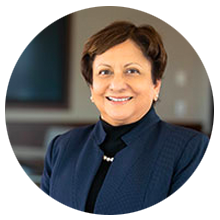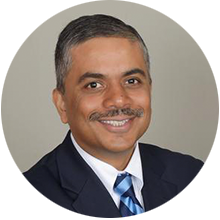
Dealing with Economic Consequences of Disruption and Identifying Golden Opportunities
Monday, June 15, 2020
By Sri Zaheer and Hari Nair
This year, 40 million Americans have applied for unemployment insurance, which is about one in four of all working age Americans. This spike has been sudden, but it hasn’t hit evenly across industries. Travel and retail have been hit hard, but we’ve also seen employment fall most catastrophically for workers in the lowest wage industries. To recover from this time of flux and loss, businesses across industries will have to disrupt the way things have always been done and help define a new normal.
Why plan for disruption now?
Businesses have always adapted to change, but the current pace of change is dramatic and unprecedented. Those who are able to adopt a disruptive mindset can more easily adapt to change and even thrive because of it. In spite of Covid-19-driven changes, people still to need to socially connect, see their doctors, and make purchases, but in many ways this will have to be different. Businesses that prosper in the coming years will have pivoted at this important moment and found solutions to new unmet needs in the market.
Looking for spaces to disrupt
The pandemic has upended the way we do many activities. Work, school, friendships, health care—everything must take place at a distance, or in some way to protect those participating from disease. However, these activities are still necessary in our lives. Rethinking them with what is called a “jobs to be done” framework can be helpful as you create solutions to pandemic-driven business and consumer problems.
Current, disruptive giants are already operating in the “jobs to be done” framework. They’ve upended the way we complete tasks. Think of Lyft, Airbnb, Kindle, Venmo—these companies help you travel, read, and pay for things, but in a completely new way. The new disruptive framework insists that consumers don’t buy products, they hire products to solve problems in their lives. What areas are frustrating for your customers right now? Is there an opportunity to accomplish the job differently, or reimagine it entirely? Thinking about your business offering in this context can help you strategize where your industry could go, especially if social distancing has impacted the way you’ve traditionally done work or provided a service.
Understanding jobs to be done during the pandemic
Many of the jobs that need to be done haven’t changed, but during the pandemic, people are finding innovative ways to solve them. Especially during a time of social isolation and fear for many, we’re realizing that there are social and emotional components of any job to be done. The key to our recovery is consumer confidence and comfort—essentially meeting those social and emotional needs in a successful fashion. While services like medical treatments and haircuts will always have demand, those who work in industries that aren’t “essential” will have to work to reduce anxiety and be innovative when it comes to safely encouraging people to participate. Part of this solution is finding new ways to support emotional and social labor with technology. Meeting these needs will be crucial to economic recovery.
Shaping new business models
Leaders in every industry are rethinking business models in response to Covid-19. Things like the work-from-home revolution will upend the way we’ve traditionally worked in office jobs and many will not want to go back. In the retail and service space, jobs are now deemed essential. If the perception of these jobs’ value remains high, it could drive positive changes for workers.
New business models stretch beyond how employees work and are compensated. The uprooting of normal behavior patterns during the pandemic has inadvertently replicated a consumer behavior test called a “deprivation study.” In a deprivation study, a product or service is taken from a group of consumers and the changes to their behavior are noted. As people’s behavior’s shift, new opportunities arise, as long as you’re able to note the changes. Deprived of many normal activities, as well as goods and services, people all over the world are compensating in various ways. Savvy businesses will be able to listen and retool their operations to fill these gaps.
As consumer behavior changes during times of crisis, brand loyalty becomes malleable as well. This is an opportunity for businesses to think creatively and fill gaps that their competition isn’t. Figuring out how to meet the functional, social, or emotional needs of customers will help them form a new preference for you instead of your competition.
Future-proofing your organization
As businesses adjust to new realities, it’s been all too clear how challenging it is to balance the demands of the present, while preparing it to thrive in the future. Future-proofing is managing these two competing requirements: defending your core business while designing the new. As business-as-usual is turned on its head, it’s even more important to solidify your plan for survival in the present and thrive in the future. This mindset is necessary for the risk of disruptive innovation to pay off.
Justifying your new ideas
Disruptive innovation is exciting and it’s fast-paced, but it’s anything but random. Despite the global upheaval and any turmoil you’re facing in the business, successful ideas will have to be well-thought-out and have solid business cases to back them up. Understanding your market, assessing the changes that have occurred in 2020, and familiarizing yourself with a disruptive innovation playbook will give your good idea structure and forward momentum to help your business thrive despite the challenging circumstances for many.
A disruptive mindset keeps your business from falling behind. Leverage Carlson Executive Education’s course on Disruptive Innovation to build the skills and mindset you need to act on your next big business opportunity.
Hone your strategic capabilities.
Join us for Carlson Executive Education’s Creating and Executing Strategy program.
Sri Zaheer
Dean, Carlson School of Management
Elmer L. Andersen Chair in Global Corporate Social Responsibility, Strategic Management and Entrepreneurship
Sri Zaheer is the current dean of the Carlson School of Management, a position she has held since 2012. Sri also serves on the boards of the Graduate Management Admission Council (GMAC) and the Federal Reserve Bank of Minneapolis, where she is currently serving as chair.
Hari Nair
Carlson School Executive Educators Network
Advanced Leadership Fellow, Harvard
Hari Nair is currently serving as an Advanced Leadership Fellow at Harvard. His most recent role was Group Chief Strategy & Innovation Officer for Sime Darby, where he lead the group’s strategy, innovation, M&A, and corporate finance teams. Hari also serves as a faculty member for strategy & innovation for Duke Corporate Education, Carlson School of Management, and Tuck School of Business Executive Education programs.
Be equipped for the future of business. Learn more about Carlson Executive Education--a resource for executives, emerging leaders, and L&D professions who recognize the value of actionable insights and industry-leading practices.

